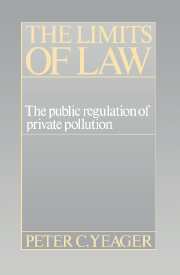Book contents
- Frontmatter
- Contents
- Preface
- Acknowledgments
- 1 The social production of business offenses
- 2 Bringing the law back in: an integrated approach
- 3 The politics of water: pollution policies to 1970
- 4 Contradiction and change: environmental consciousness and the mobilization of law
- 5 Legislating clean water: changing conceptions of environmental rights
- 6 Controls and constraints: from law to regulation
- 7 Enforcement: the social production of environmental offenses
- 8 Ecology, economy, and the evolution of limits
- Bibliography
- Index
1 - The social production of business offenses
Published online by Cambridge University Press: 23 May 2010
- Frontmatter
- Contents
- Preface
- Acknowledgments
- 1 The social production of business offenses
- 2 Bringing the law back in: an integrated approach
- 3 The politics of water: pollution policies to 1970
- 4 Contradiction and change: environmental consciousness and the mobilization of law
- 5 Legislating clean water: changing conceptions of environmental rights
- 6 Controls and constraints: from law to regulation
- 7 Enforcement: the social production of environmental offenses
- 8 Ecology, economy, and the evolution of limits
- Bibliography
- Index
Summary
On October 5, 1976, the U.S. government fined the large, multinational Allied Chemical Corporation $13.24 million for criminal discharges of the toxic pesticide Kepone and other chemicals into Virginia's James River. Although some observers decried the fact that the several corporate officials indicted for the offenses had been acquitted, the case nonetheless represented a high point in the growing effort to legally protect the natural environment from despoliation. Not only was this single fine greater than the total fines and penalties imposed in all Environmental Protection Agency-initiated cases that had been previously concluded (through September 1976), but merely seven years earlier neither criminal fines nor civil penalties were part of the federal government's general response to the increasingly threatening environmental degradation due to water pollution.
Seven years later the EPA's regulatory program was in disarray. Beset by deep budget cuts and overseen by a leadership eager to relieve industry of regulatory costs, the agency's enforcement efforts were in serious decline in all areas of environmental protection. This was clearly a consequence of the Reagan administration's wideranging policy to divest private enterprise of public regulation as part of a “supply-side” strategy to stimulate economic growth. The results of this policy, however, proved more dramatic at EPA than in any other regulatory arena.
- Type
- Chapter
- Information
- The Limits of LawThe Public Regulation of Private Pollution, pp. 1 - 16Publisher: Cambridge University PressPrint publication year: 1991



